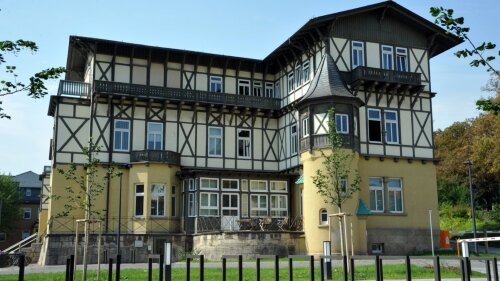
Programme Content
- How do people behave at work, in teams and in organizations - especially when problems or errors occur - be it in a surgical team, in software development or in a restaurant? And how is the world of work changing as a result of megatrends such as demographic change and digitalization?
- How do people develop from birth to death and why do not all people develop in the same way? How can individual development paths be promoted and learning processes be designed effectively?
- Why do people commit crimes and what does successful crime prevention look like? What interventions are available and how can a reliable recidivism prognosis be drawn up?
These questions outline central challenges of our society, which belong to the professional fields of specialized psychologists beyond clinical work. Our Master's degree programme in Work, Education/Development, Law and Health teaches core competencies for professional and academic practice in these fields of work.
In addition to a comprehensive methodological and diagnostic education, the programme enables students to specialize in three different profile lines:
(a) Work, Organizational and Health Psychology
(b) Developmental, Educational and School Psychology
(c) Forensic Psychology
Alternatively, it is possible to (d) create your individual area of specialisation by combining the courses you are most interested in.
Your studies are complemented by general modules providing methodological and diagnostic knowledge. These include techniques of systematic analysis, integration and assessment of specialised scientific literature, the development and application of diagnostic tools and hypothesis testing procedures.
Programme Structure
The master's degree will be your second professional qualification. The regular duration of the programme is four semesters during which different types of lessons (e.g. seminar, lecture, practice session) are offered in each module.
The master's programme is worth 120 credits (with each credit equating to 30 hours including in-class time, preparation, follow-up work, coursework and examinations).
The Psychology master's programme with a focus on Work, Education/Development, Law and Health includes a methodological module, a diagnostic module, basic knowledge and applied knowledge in the chosen area of specialisation, a project module, a minor subject (required elective module), an internship and the master's thesis.
This Could Be Your Study Plan
| 1st Semester | 2nd Semester | 3rd Semester | 4th Semester |
|
Research Methods 1–2 |
Minor Subject** (10 credits) |
Master's Thesis (30 credits) |
|
| Diagnostics and Expert Opinions (10 credits) |
Internship |
||
| Basic Knowledge I–III* (15 credits) |
|||
| Applied Knowledge I–III* (15 credits) |
|||
| Project Work I–II (10 credits) |
|||
* You can attend the lessons of the Basic Knowledge and Applied Knowledge modules flexibly throughout the respective semesters.
** You can attend the Minor Subject lessons depending on the semester in which they are offered (please note the respective module description).
Why Jena?
- Excellent research: The Jena Institute of Psychology is particularly strong in researchExternal link. Our Research concentrates on two major areas: Perception and Interaction and Development and Health.
- Outstanding teaching: In addition to the strong methodological focus, the programme is characterised by modern and internationally oriented teaching, which is also supported by numerous national and international cooperation and evaluation projects.
- Individual specialisation: Students have the opportunity to deepen their studies individually by selecting profile lines: They can choose between three profile lines (1) Developmental, Educational and School Psychology; (2) Work, Organisational and Health Psychology or (3) Legal Psychology. If one of the three profile lines is chosen, this will be shown as an addition on the Master's certificate.
- Practical: The combination of first-class research and application projects with internships and theses helps our graduates seamlessly introduced in their targeted professional and research fields.
- Unlimited Opportunities: Experience internationality! Our university attracts students and academics from all over the world with attractive conditions and shapes Jena's character as a future-oriented and cosmopolitan city. These are ideal conditions for prospective international students.
- Adventure abroad: You can easily fulfil your dream of spending a semester abroad during your studies. Our university has a worldwide network of partner universities.
After Graduation
Depending on the chosen specialization, a wide range of opportunities open up in various areas of psychological professional practice:
- Companies and organizations: e.g. in the field of personnel management, management consulting and development, in change, quality and risk management as well as in occupational health management
- Educational, advisory and support institutions, teaching and research institutions: e.g. as a school psychologist, in the design of prevention and intervention measures in (non-) school education and as a psychological expert in family and social counseling centers
- Legal and forensic psychology: e.g. in the preparation of expert opinions in court proceedings and in the prison system, in the planning and implementation of prevention measures and in advising the police and other security authorities
Downloads and Links
- Study regulations de
- Examination regulations de
- Admission regulations de
- Module catalogueExternal linkde
- Sample curriculumExternal linkde
- Application via Friedolin 2.0
- Master application guidepdf, 2 mb
- Application deadlinespdf, 187 kb · de
- Recognised evidence of a subject-specific, specialisation-related scientificpdf, 154 kb
Admission requirements
-
Undergraduate degree or equivalent
For this master's programme, you need a subject-specific bachelor of science degree (minimum 6 semesters/180 ECTS credits) in psychology or a comparable undergraduate degree in combination with a personal suitability for the programme. Your degree must include:
- 30 ECTS credits in psychological methodology, 10 of which in statistics,
- 40 ECTS credits of basic knowledge such as General Psychology, Biological Psychololgy, Developmental Psychology, Social Psychology as well as Differential and Personality Psychology,
- Modules taken in at least two areas of application (e.g. Work and Organisational Psychology, Pedagogical Psychology, Clinical Psychology).
Altogether, your degree must include lessons or modules in psychology amounting to at least 150 ECTS credits.
-
Selection procedure
If the number of applicants entitled to admission exceeds the number of available study places, they are admitted according to a ranking list established as the result of a selection procedure of the Faculty. The following criteria are considered:
- a) final grade of the first undergraduate degree,
- b) final grade of the higher secondary education certificate,
- c) the applicant's subject-specific, scientific suitabilty in the chosen area of specialisation (proof of which may be previous professional experience as student or scientific assistant and/or co-authorship of scientific publications).
For further information about the selection procedure please see the Admission Regulations (under the Download section).
-
Language requirements
This master's programme requires the following language proficiency from international applicants:
- German language proficiency at minimum level DSH-2 (or a recognised equivalent)
- English language proficiency at level B2 (no proof required)
Application documents
-
CV
Your CV should have a tabular form, containing key information on your school record and academic career.
-
University entrance qualification certificate
Please upload at the online application system your university entrance certificate/school leaving certificate. Usually, this means the school graduation diploma (German "Abitur"), i.e. the diploma that makes you eligible for studies at an University or other institution for higher education. Be mindful of the fact that here, we do not need any University diploma but a High School diploma!
-
Previous university degrees earned
All previous University degrees (Bachelor of Arts, Bachelor of Science, etc.) if available before the application deadline - if not, please make a note of the anticipated date of issue of your degree certificate. Please upload your University degree or the most actual, detailed transcript of records/ mark sheet of all semesters available to you, should you not hold your degree certificate at the time of application. The main document is the degree/ transcript based on which you apply for the master programme.
-
Corresponding transcripts
Detailed transcript of records/ mark sheet of your first, subject-specific University degree, with which you apply for the master's programme (minimum requirement is the transcript/mark sheet up to the semester before the last). This trancript MUST contain an overall cumulative grade point average or average mark.
You need at least 135credits (ECTS) by the time you apply.
-
Proof of subject-specific scientific suitability in the chosen area of specialisation, where applicable
For example:
- official letter from a university confirming previous professional experience as scientific assistant at a university of at least 90 hours,
- letter from the publisher or invitation to review the publication confirming your co-authorhsip of peer-reviewed scientific publications in scientific journals.
Additional application documents for international students
-
Proof of German language proficiency
For German taught master's programmes, i.e. programmes with (predominantly) German as language of instruction, a sufficient German language proficiency proof is mandatory.
The Friedrich Schiller University Jena accepts the following certificates as German language proficiency proof exclusively:- the Goethe-Zertifikat C2 (GDS),
- the Deutsche Sprachdiplom der Kultusministerkonferenz (DSD II),
- the TestDaF, minimum TDN 4 in all four parts of the examination,
- Deutsche Sprachprüfung für den Hochschulzugang (DSH), min. level 2 (= DSH-2),
- Certificate telc Deutsch C1 Hochschule (min. level "befriedigend"),
- a German language examination in the framework of an assessment test at a preparatory college.
Please note: We strongly recommend that you provide the required German language proof at the time of applying.You have not yet taken the DSH exam, the TestDaF or another equivalent exam (see above) or have not yet received the test result? Then please do the following:
- Upload a certificate attesting your German language skills at min. level B2 (according to the Common European Framework of Reference for Languages) AND
- upload a confirmation that you have registered for a language exam (e.g. DSH examination, TestDaF or an equivalent examination) to your online application. Please make sure to register for the test well in advance. In case you receive an admission offer, you must provide the language certificate by the time of enrolment (by the end of March resp. the end of September)!
The following applicants are exempted from providing proof of their German language skills:
- Applicants, who have obtained a German taught bachelor's degree within one of the following countries: Germany, Austria, Switzerland, and Liechtenstein. This applies only to degrees that were awarded by a university in the relevant country (no satellite campuses or international branch campuses in other countries, no correspondence course degrees, no joint- or double-degrees with institutions in other countries);
- Holders of a German, Austrian or Swiss (from school where the language of instruction is German) university entrance qualification.
-
Translation of foreign/external application documents
Every mandatory application document from foreign/external countries must also be available in either English OR German translation. Such a translation has to be conducted by officially acknowledged/ sworn translators or translation offices.
-
Proof of grading system
External/foreign degree certificates/ transcripts of records must contain information on the grading system (= description of the maximum grade possible and the minimum passing grade) used at the respective University.
-
Certificate APS
Applicants with degrees from India, Vietnam or China must submit the original APS-certificate issued by the German Embassy.
-
University entrance exam
Applicants from the following countries must submit a certificate of their university entrance examination/college entrance examination:
- Iran (College entrance examination certificate or certificate of pre-university course/year)
- Republic of Korea/South Korea: SAT (Scholastic Ability Test)
- People's Republic of China: College entrance examination certificate ("Gaokao")
Contacs
JenTower, Löbdergraben 1
07743 Jena
Google Maps site planExternal link
Haus 1
Am Steiger 3
07743 Jena
Fürstengraben 1
07743 Jena
Google Maps site planExternal link
Office hours:
Telephone consultation:
Tuesday - Thursday
10 am - 11 am
Personal consultation:
Tuesday - Thursday
2 pm - 3 pm
Live chat:
mondays and fridays
10 am - 12 noon
Ticket enquiries via Service Desk at:
www.uni-jena.de/service-msz
Postal address:
Friedrich Schiller University Jena
Master Service Centre (MSZ)
Fürstengraben 1
07743 Jena
Video chat:
To the video chat – Zoom
Videochat ZeitenTuesday - Thursday
3:15 pm - 4 pm
Password Master
Data protection informationpdf, 101 kb
